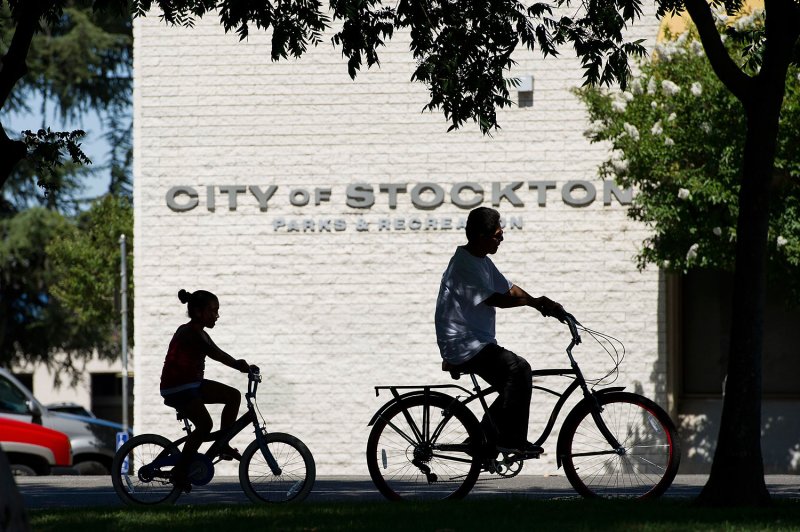ImpactAlpha, Nov. 21 – It’s not surprising that politically well-connected bigshots would press for, and in some cases receive, special treatment for pet projects to qualify them for Opportunity Zone tax breaks.
What’s more surprising is the growing number of examples in which capital chasing the Opportunity Zone tax incentives has been a lifeline for local industries affected by the trade war, a source of financing for the repurposing of blighted buildings and a way for small-town mayors to put their cities on the map. Some of those headlines:
- “Las Vegas council approves financing for major affordable housing project”
- “Vacant Detroit building to reopen with 14,000-square-foot food hall”
- “Filling in the lobster supply chain: New processing sites are keeping dollars in Maine”
- “Fredericksburg Food Co-op to create ‘Opportunity Zone Fund’”
These stories of community revival contrast with the drumbeat of critical stories in national outlets, including the New York Times and Pro Publica. The watchdogs have done good work raking the muck for examples of questionable treatment for wealthy investors and campaign donors, such as Wayne Huizenga and Jeff Vinik, Michael Milken and Dan Gilbert, with projects that may run counter to the intent of the Opportunity Zone legislation.
“We see that the narrative is starting to be written already that the law is only serving those who really don’t need additional help,” says Tom Bartlett of 20 Degrees, a DC firm that helps impact ventures diversify revenues and raise capital. “That will be the narrative if we don’t provide some counterexamples and if people remain apathetic and stay out of the marketplace.”
The upside of the recent narrative that Opportunity Zones have been a giveaway to the rich is that Congress may be spurred to act on legislation to beef up Opportunity Zone regulations, for example by requiring greater reporting and transparency and prohibiting self-storage facilities and luxury housing from qualifying for the tax breaks (see, “Congressional Democrats push for fixes to Opportunity Zone tax incentive”).
The downside is that the anecdotal evidence of special treatment may squelch enthusiasm for Opportunity Zone projects and undermine the marketplace before high-impact, community driven projects get off the ground.
“Information makes markets,” says Kenan Fikri of Economic Innovation Group, which is literally putting innovative, high-impact deals on the map. EIG’s Opportunity Zones Activity Map rounds up dozens of local and impact-oriented funds, deals and initiatives, including many reported in ImpactAlpha. The think tank, which pushed to pass the tax incentive, wants to increase the flow of information on deals, innovative models and use cases.
“The Opportunities Zone market is forming and it’s looking really good,” says Fikri.
On the sidelines
The battle of the narratives already has shaped the Opportunity Zone investment landscape. If investors with get-rich-quick schemes have been quick out of the gates, impact-oriented investors have been slower to move their money.
Investors hesitant to enter the Opportunity Zone market risk missing an opportunity to participate in a long-overdue moment of economic excitement in America’s overlooked cities.
“There has been a lot of hesitance and risk aversion from impact investors about playing a leadership role in investing in Opportunity Zones,” Blueprint Local’s Ross Baird told ImpactAlpha. Some of that is justified: “Private capital has in many cases been really harmful in distressed communities over the years,” he says.
The market will take the shape of who is investing, Baird says. “Impact investors can be really vital in creating new wealth for communities that have been previously excluded, and need to step up and help shape the market.”
20 Degrees co-founder Sara Gibson says impact investors taking a “wait and see approach” to the Opportunity Zone market need to shift gears to “aggressively investigating it and put some small dollars behind it.” The legislation is happening, Gibson says. “It’s already here.”
The Washington DC-based consulting firm’s Opportunity Zone Justice Accelerator is helping connect formerly incarcerated and returning-citizen entrepreneurs with Opportunity Zone funding.
Homegrown opportunity
In Baltimore, Leonard Mill of Verte Opportunity Fund credited Ben Seigel of Baltimore Development Corp., the city’s economic development arm, for helping Verte identify an investment it made in surgical robot maker Galen Robotics.
Indeed, for every case of an extractive or illegitimate Opportunity Zone investments, there are multiple examples of investments that are boosting homegrown entrepreneurs, local businesses and inclusive development projects in Portland (Maine), Erie, Birmingham, Pittsburgh, Washington D.C. and other cities.
“We need more folks to get involved in this so that we actually have a level playing field for investment, both on the Opportunity Zone side but also just in general in these markets,” says Launch Pad’s Anne Driscoll.
The New Orleans-based network of coworking spaces is itself a qualified Opportunity Zone operating business as well as a source of Opportunity Zone-located venture opportunities in “momentum markets,” including Memphis, Nashville, Newark and Stockton, Calif. “There are great companies that can be built anywhere,” she says.
On a field trip from last month’s SOCAP conference in San Francisco, Driscoll took a group of impact investors on a two-hour bus ride to Stockton to visit a high-end furniture maker that had fled to Stockton from the high-rents in the Bay Area.
Mayors like Stockton’s Michael Tubbs and Louisville’s Greg Fischer, along with Alex Flachsbart of Opportunity Alabama, she says, have used Opportunity Zones “to focus energy, focus investment, and focus capital into areas that need it most or will benefit the most from it.”
“If the bill goes away and everyone sees it as a flop, I still say it is a huge success,” says Driscoll. “The amount of conversation that is happening across the country about these cities and these markets that deserve to have a light shone on them is not going away.”
ImpactAlpha’s Amy Cortese contributed reporting.











